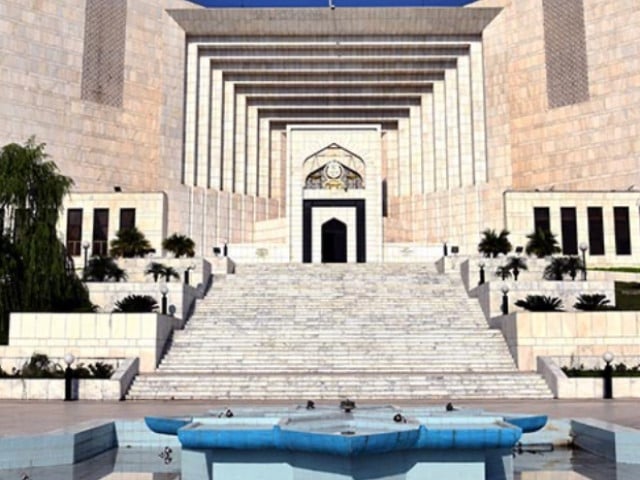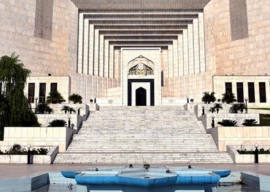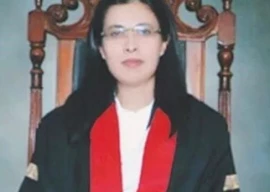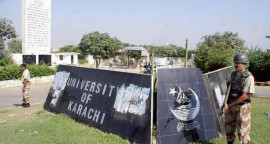
The Supreme Court has declared that the Election Commission of Pakistan (ECP) has failed to perform its constitutional duty to actualize the will of the people and conducted itself in a manner that is not in line with its constitutional duty.
"It is unfortunate that despite clear pronouncements by this court, the ECP conducts itself in a manner that is not in line with its constitutional duty.
"Rather, [its conduct] aligns with the notion that they have the constitutional power to disregard other constitutional institutions and the basic right of the vote," said a six-page additional note written by Justice Ayesha Malik in MNA Adil Bazai's case.
Justice Ayesha was part of a three-member bench led by Justice Syed Mansoor Ali Shah and comprising Justice Aqeel Ahmed Abbasi that on December 12 unanimously struck down the ECP's decision to disqualify Bazai on account of his alleged defection under Article 63A of Constitution.
The judge whose opinion was endorsed by other two members of the bench reminded the ECP that elections are the lifeline to democracy and the ECP is the guarantor of electoral integrity.
"The independence of the ECP, therefore, is fundamental to the election process without which the very foundation of democracy is undermined.
"This court has also recognized and declared that the ECP should not become subservient to political influences, or political engineering rather remain an impartial custodian of democracy as any leaning of the ECP in favour of the government would compromise the legitimacy of the political system.
"At the heart of protecting electoral integrity is the right to vote and the exercise of this right, by the people. The supremacy of the vote underscores the idea that power and legitimacy in a democratic system derives its consent from the governed which is why an independent constitutional body is required to ensure that the will of the people by way of election is actualized."
It said the facts of the instant case compelled the bench to once again reiterate that the constitutional duty of the ECP cannot be considered as an overarching constitutional power vis-à-vis other constitutional provisions and institutions.
"The ECP is, as per the constitutional mandate, an independent body, duty bound to conduct free and fair elections and duty bound to ensure that those elected by the people remain in government.
"The independence of the ECP is the fundamental safeguard in a democratic system which maintains the integrity of the elections, and ensures that the will of the people translates into their consent to be governed by the elected representatives."
It said this independence gives legitimacy to the government because it is based on the choice of the people. This is what builds public confidence, protects the rule of law and protects people from political manipulation"
"The Constitution expressly provides that the authority of government rests solely on the will of the people. This will manifests itself through the peoples exercise of their right to vote and participate in the electoral and political process.
"Elections are the primary manner in which registered voters elect representatives who will govern on their behalf and exercise the powers of the government. This is a fundamental right guaranteed by the Constitution," it added.
In the main verdict authored by Justice Syed Mansoor Ali Shah and endorsed by the other two members, the SC noted that the ECP's findings on the genuineness and validity of the consent affidavit dated February 16, 2024 were contrary to the weight of the material on record and legally unsustainable.
The PML-N claimed that Bazai, an independent candidate who won elections at Quetta's NA-262 constituency, had initially submitted an affidavit for joining the party.
However, he later "switched allegiance", according to the PML-N, and became part of the Sunni Ittehad Council (SIC), a party comprising PTI backed independent candidates.
Bazai had claimed that the affidavit with regard to his joining the PML-N was fake. The ECP had, however, de-seated him in view of the Election Act, 2017 on November 21.
The SC said since Bazai was not found to be a member of the PML-N's Parliamentary Party, the declarations made by the PML-N chief regarding the appellant's defection from that party, and the confirmation thereof by the ECP through the impugned orders, were without jurisdiction.
"Consequently, these appeals are allowed. The impugned orders passed by the Commission are set aside, and the declarations made by the party head of the PML-N that the appellant had defected from the said political party are not confirmed.
"Accordingly, the appellant's membership of the National Assembly from seat NA-262 stands restored as an independent member, not as a member of the parliamentary party of the PML-N."
The court however, clarified that the finding of this court regarding the genuineness and validity of the consent affidavit dated February 16 was subject to final determination by a civil court.
"Given the seriousness of the appellant's allegations regarding the fabrication and use of a false consent affidavit against Shehbaz Sharif, the then president of the PML-N and now the prime minister of Pakistan, we expect that the civil court, where the civil suit is sub judice, and the Magistrate, before whom the criminal complaint is pending adjudication, shall decide the same as early as possible," it said.

1737426578-0/Untitled-design-(65)1737426578-0-405x300.webp)


1737416356-0/Trump-(9)1737416356-0-165x106.webp)



















COMMENTS
Comments are moderated and generally will be posted if they are on-topic and not abusive.
For more information, please see our Comments FAQ